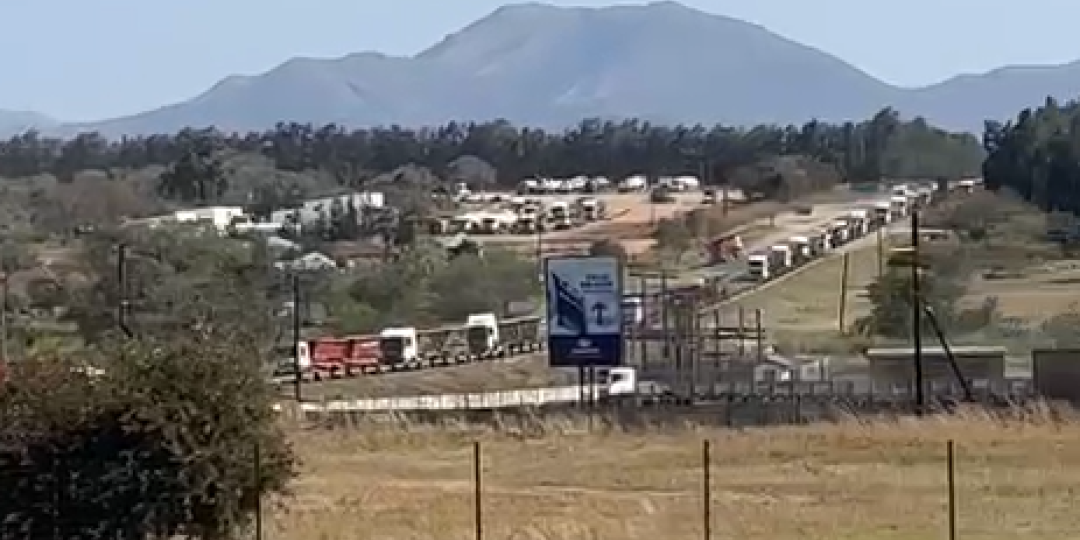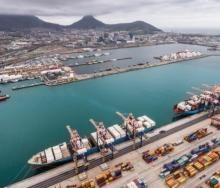Transporters shipping coal and chrome through South Africa’s Lebombo Border Post to the Port of Maputo are applying pressure on the South African Revenue Service (Sars) and one of its service providers to revert to an older cargo processing system at the congested crossing.
From what is understood about the new system, trucks are processed one at a time to prohibit build-up inside the customs control zone.
But earlier today, August 17, an ore carrier explained that the new system is flawed because if one truck has an issue at the border, everyone down the line is held up.
When this post was generated, the queue on the highway was well past Hectorspruit, about 33 kilometres from the border.
A source told Freight News that the queue was closer to 40 kilometres, the worst it has been in recent times.
A driver stuck in the queue, who will be sleeping in his truck tonight, risking criminals targeting them, said there are about 1120 tippers in the queue.
Considering that an ore truck is about 22 meters long, and that four easily fits into a kilometre, one of the transporters said the number of trucks waiting to pass through Lebombo is closer to 1200.
In the meantime, transporters have been asked to remain calm as Sars and its service provider, which is not based at the border, try to speed up processing.
Transporters though maintain that the situation on the ground clearly shows that the new system is not working.
The buildup in the queue comes at an unfortunate time for trade facilitators, road freight operators and community representatives from the area, as last night saw the implementation of stepped-up law enforcement of the queue.
The new measure came to pass after stakeholders urged the government to intervene in the chaos that sets in, usually at night, when trucks start skipping the queue.
Recently taxi associations started marshalling trucks at night to protect commuter interests as passengers travelling between Mozambique and South Africa had begun to withdraw from the N4 because of night-time attacks.
Often caught in the grid-locking, commuters became easy prey for criminals, particularly gangsters from Ressano Garcia in Mozambique.
Although the no-nonsense involvement of taxi marshals brought respite, the associations from as far afield as Gauteng indicated a couple of weeks ago that they wanted to withdraw from the border as it’s not really their responsibility to police truck trade through the over-burdened transit.
Last night consistent pressure on law enforcers to police the queue finally yielded results, a business representative from Komatipoort said.
He added though that the stepped-up visibility of traffic officials and police force members wasn’t enough, and that authorities should be following through with the strong-armed response pledged during a border visit by Vusi Shongwe, Mpumalanga's MEC for Community Safety, Security and Liaison.
But so far, no drivers have been arrested for endangering others in the queue, nor have any trucks been impounded.
One of the transporters said the increased visibility of law enforcement also appears to have been short-lived, as the number of police and traffic officials on the road had decreased during the day.
And while the queue grows closer to Malelane almost 50 kilometres from the border, ore carriers also want to know why general cargo trucks continue to bypass the queue.
Many say this arrangement, to allow taught liners and hauliers of perishables to skip the line of tippers, is being abused and adds to bottlenecking at the border.
A suggestion that trucks be pulled into Kilometre Seven, a waiting area where trucks can be processed before being sent to the border, was shot down because most transporters refuse to pay for using this facility.
To make matters worse, apart from the system used by Sars, is an earlier communique from the revenue collector that it was “experiencing issues on our Customs Processing Platform.”
“The border is worse than it has been in weeks,” a transporter said.
“It’s taking too long to get through. We welcome policing along the queue but it’s not fair on us (ore freight operators) to sit in the queue while Sars and its service provider protect their business interests.”
At just before 5pm, Freight News heard that the queue was more than 40 kilometres, and that erratic driving by truckers, desperate to avoid the queue and pressured by their employers to make haste, was creating a dangerous situation on the N4.













